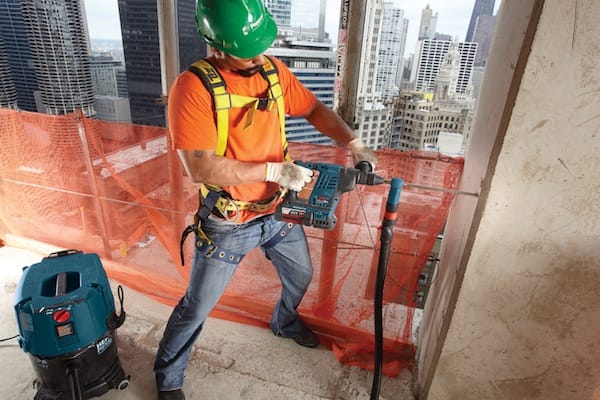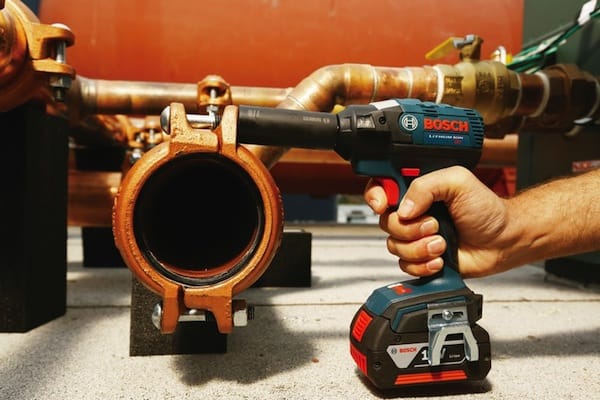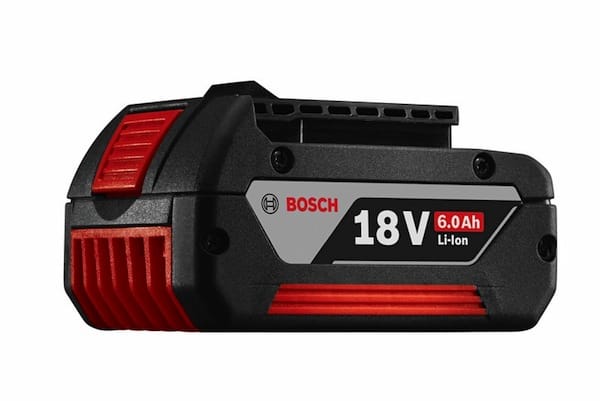A few years ago, Mechanical Hub asked the major players in tool manufacturing what was going on as far as tool battery technology innovation. Recently, we caught up with Jim Bohn, Director, Strategic Development, Robert Bosch Tool Corporation to discuss Bosch’s battery tech.
Here is the conversation:
What is the latest and greatest in Bosch battery technology?
Bohn: Bosch continues to focus on the “power source” for cordless power tools due to the continued acceptance of cordless by pros. The key needs for pros when using cordless tools are runtime and performance. Expectations of switching from corded to a like cordless tool is that it will perform with the power, speed and impact… at an acceptable runtime. Listening to and understanding this feedback from pros simply means higher amp hours (Ah) (18V – 5.0 and 6.0 and 12V – 4.0) batteries, but in an ergonomic design for a balanced and comfortable styled tool (e.g. the 18V batteries 4.0 – 6.0 are all the same size).
The charger is also very critical because PROs expect quick charging results. Fast Chargers are great, but the way a battery is charged will also affect the life time of it. The launch of the Wireless (inductive) Charging system is also a first to the power tool market and a real technology challenge. Being the only power tool with such technology shows Bosch’s advancement into innovation of the Cordless “power source.”
Please talk about Bosch’s dedication to research and development, especially in terms of battery technology.
Bohn: Bosch dedicates certain resources to research and development every year. The cornerstone of Bosch is “Invented For Life” and this carries on to the culture that we create products based on user’s needs and feedback…products that will improve the productivity and efficiency in their daily routines. Cordless is the future and Bosch definitely is spending resources that will further enhance and improve the current battery and charging platforms. The power source is one aspect of the power tool world, but we also have many projects centered around tools of course. The IoT will also have a big impact on future products.
Are you out field-testing your tools?
Bohn: Field testing is the “true test” for any product to assure that it confirms the intended performance and efficiencies for pros needs. Bosch does field testing everyday with pros.
If you could let us see the Bosch crystal ball, what are some things you could share with us regarding the future capabilities of battery technology?
Bohn: Battery technology is complicated and Bosch is always looking into batteries: 1) performance levels, 2) charging needs and 3) environmental effect. All three are important and must be realized throughout any development process.
Three years ago I asked about WiFi in the tools. Well, now it’s here! Can you talk about the advantages of WiFi in tools?
Bohn: The Internet of Things (IoT) is the world today, especially in many other industries and slowly coming to the power tool world. This digital world can be complex and represents a new element that many power tool users have not been exposed to before. Smart phones are the initial entry into IoT with “connection” via an app. The connected technology will allow users access new capabilities: track tools for better accountability, understand the performance of tools, how long it takes to complete an application, theft protection, maintenance tracking and provide other information that can improve working efficiencies and many other opportunities that will take the change in mindset for pros in their everyday environments.

What about charging times?
Bohn: Charging batteries is a challenge in that you need to balance the activity within the cells, due to the higher rate of energy being required from the battery packs. Charging these cells becomes complex to manage the heat levels of the cells, managing the multiple cells in each battery pack and then understanding the chemical balances to allow for fast charging, but also maintain a respectable lifetime of the battery. Are charging times getting quicker, not necessarily due to the higher Ah being developed, required and needed for performance levels with Cordless tools; beyond the basic drill driver.
It would seem that the bigger number on the battery means better. Is this always the case? Explain.
Bohn: Yes, larger numbers on most power tools does mean better. Normally, the larger the number the better the performance, runtime, etc. You need to be careful with numbers overall and clearly understand what the number relates to and determine if that number is “better than” another number. More specific questions related to number relationships is necessary to completely and accurately answer this question.
Are some of the batteries backward compatible?
Bohn: The Bosch strategy is to ensure backward compatibility with its battery platform.
Do you offer or intend to offer a hybrid corded/cordless tool?
Bohn: Bosch does not provide information about potential tool development in advance of introduction to the market.
Where do I go for warranty info/customer service?
Bohn: Bosch customers can find information about Bosch power tool products and service at www.boschtools.com or by call 800-Bosch-99
There are a lot of companies that boast that their tool & battery combo is the best. Why Bosch?
Bohn: The Bosch power tool offering includes several advantages:
• Brushless EC motor technology offers longer life, increased efficiency, less maintenance and the same power as a corded tool at a lighter weight and size.
• Higher-voltage batteries, up to 36 volts, reduce the overall strain on the individual Lithium-ion cells and enable them to last longer. A larger battery doesn’t need to work as hard as an 18-volt battery in the same heavy-duty application, resulting in less heat and extended battery life.
• Electronic Cell Protection (ECP), located within the Bosch tool, can manage the battery’s activity to eliminate overheating and extend battery life. ECP is key to long-term battery life in professional applications.
• The power tool industry’s best batteries are made to stay cooler at all voltage levels. Battery housings should conduct heat away from battery core.
Finally, there’s the Bosch heritage of quality that comes with every product.






Join the conversation: